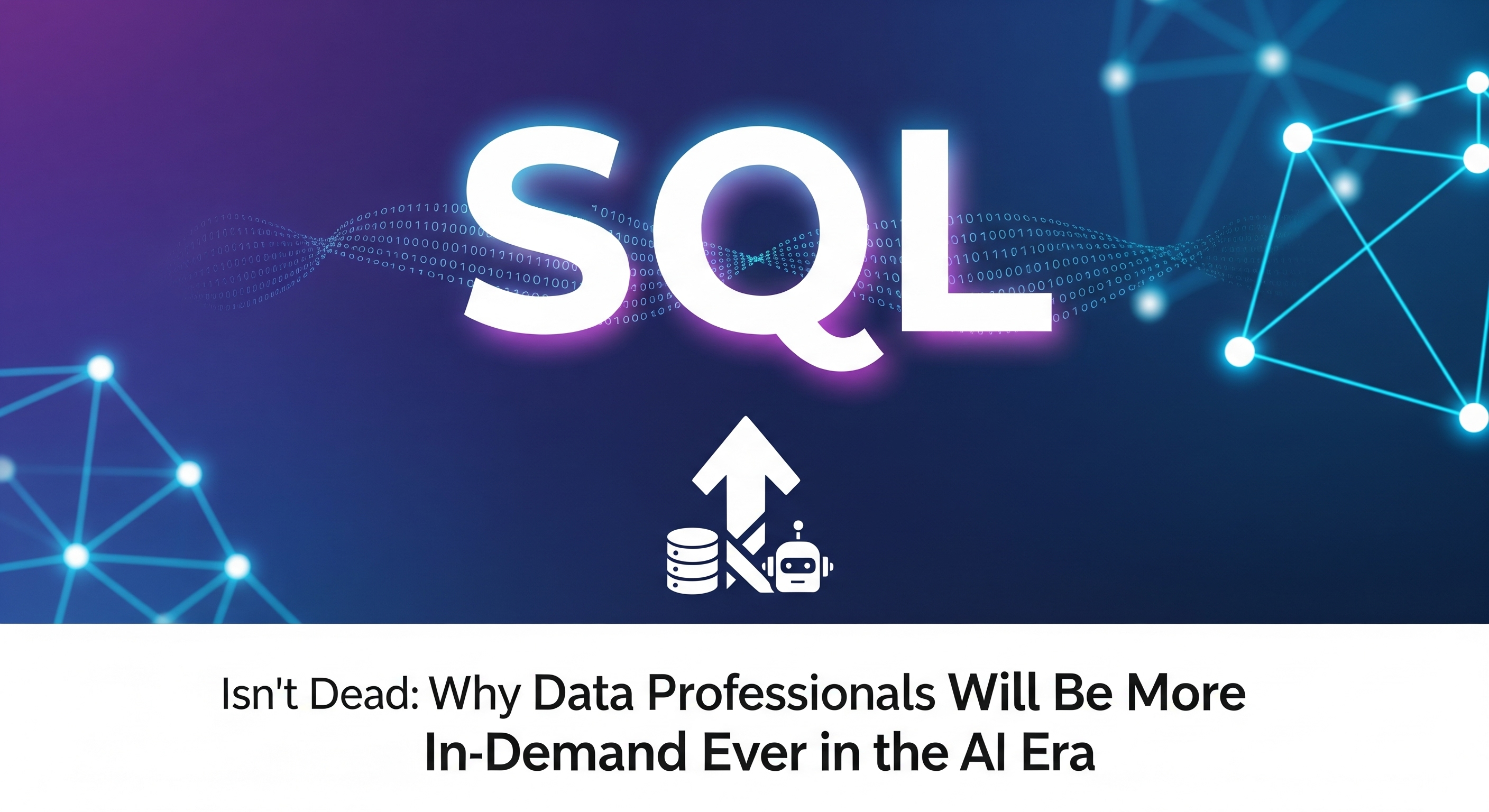
SQL Isn't Dead: Why Data Professionals Will Be More In-Demand Than Ever in the AI Era
Introduction
In the fast-paced world of Artificial Intelligence (AI), machine learning, and automation, one common misconception keeps resurfacing: “SQL is outdated.” Many believe that the rise of NoSQL databases, cloud-native systems, and AI-driven data tools has diminished the importance of SQL.
But the reality is the opposite. SQL is not only alive—it’s thriving. In fact, the demand for SQL-skilled data professionals is growing stronger in the AI-powered era. From AI model training datasets to business intelligence dashboards, SQL remains the backbone of data querying, integration, and management.
This blog will break down why SQL continues to dominate, why data professionals with SQL expertise are more in-demand than ever before, and how you can future-proof your career in this exciting landscape.
What is SQL and Why It Matters in 2025
SQL (Structured Query Language) is a standardized programming language used to manage and query relational databases. Despite being around for decades, SQL has consistently evolved to meet new data challenges.
-
Ubiquity: Nearly every major company—from startups to Fortune 500 enterprises—relies on SQL databases (MySQL, PostgreSQL, Microsoft SQL Server, Oracle).
-
Standardization: Unlike niche tools, SQL is universally understood across industries.
-
Integration with AI/ML: AI tools like ChatGPT, TensorFlow, and cloud-native AI pipelines rely heavily on structured data, much of which is stored and processed using SQL.
If you’re aiming to excel in Data Science, Data Engineering, or AI-driven Business Analytics, SQL will remain your strongest foundation.
Why SQL is More Important in the AI Era 1. AI Needs Clean and Structured Data
AI models are only as powerful as the data they’re trained on. SQL plays a central role in:
-
Cleaning and preprocessing raw datasets
-
Extracting meaningful insights from relational databases
-
Standardizing data pipelines for AI/ML models
Without SQL, businesses would struggle to structure and filter the massive datasets AI consumes.
2. SQL Powers Business Intelligence and Data Analytics
While AI provides advanced predictions, business intelligence (BI) platforms like Tableau, Power BI, and Looker still rely on SQL queries under the hood. Data analysts and decision-makers need SQL to:
-
Build real-time dashboards
-
Run ad-hoc queries
-
Identify key performance metrics for strategy building
3. SQL Works Hand-in-Hand With NoSQL and Big Data
Many assume NoSQL databases (MongoDB, Cassandra) will replace SQL. In reality, modern enterprises use both:
-
SQL for structured data and financial records
-
NoSQL for unstructured data like logs, IoT data, and text
-
Hybrid solutions (like Google BigQuery and Snowflake) that combine SQL querying with big data storage
4. Cloud and AI Integration Keeps SQL Relevant
Cloud platforms like AWS, Azure, and Google Cloud have advanced AI tools, but almost all of them support SQL queries as the foundation for handling enterprise data.
-
AWS Athena, Google BigQuery, and Azure Synapse Analytics all rely on SQL.
-
Cloud-based AI pipelines integrate SQL datasets directly for model training.
5. SQL Skills Are in High Demand for Data Roles
According to 2025 hiring reports, SQL ranks in the top 3 most in-demand data skills across job portals worldwide. Roles where SQL dominates include:
-
Data Analysts
-
Business Intelligence Developers
-
Data Engineers
-
Machine Learning Engineers
Examples of SQL in the AI Era
-
AI-Powered Healthcare: SQL is used to query patient data stored in relational systems for diagnostics and AI-driven predictions.
-
Finance & Banking: SQL secures and structures massive transaction records while AI detects fraud.
-
Retail & E-commerce: AI recommendation engines still rely on SQL databases to retrieve structured product and user data.
-
Marketing & AdTech: SQL helps segment audiences, while AI personalizes campaigns.
How Data Professionals Can Leverage SQL in 2025
-
Master Core SQL: Learn advanced querying (CTEs, window functions, joins).
-
Learn SQL with Cloud: Practice on BigQuery, Snowflake, Redshift, Azure Synapse.
-
Combine SQL with Python/R: For AI/ML pipelines and analytics.
-
Understand AI Data Workflows: Get familiar with how SQL integrates into ETL (Extract, Transform, Load) pipelines for AI.
-
Stay Updated: Learn modern SQL extensions for data warehouses that power AI applications.
SQL vs AI Automation: Why Humans Still Matter
While AI can automate query generation, data professionals bring critical thinking and domain knowledge that machines cannot replace. For instance:
-
Ensuring data accuracy before training AI models
-
Applying business logic that AI cannot infer
-
Making ethical and compliant decisions around data usage
This is why data professionals who know SQL will continue to be irreplaceable in AI-driven organizations.
Future of SQL in the AI Era
SQL is evolving, not disappearing. Some upcoming trends include:
-
AI-assisted SQL: Tools like ChatGPT for SQL query generation.
-
Real-time SQL for streaming data (IoT, sensor data).
-
SQL with vector databases for AI-driven search and embeddings.
-
Self-service analytics where non-technical users generate SQL queries through AI-powered assistants.
Conclusion
Despite predictions of its decline, SQL isn’t dead—it’s the lifeline of AI and modern data-driven businesses. With companies generating more structured data than ever, SQL remains the most reliable way to extract, manage, and analyze information.
For aspiring data professionals, data analysts, and AI enthusiasts, SQL is a non-negotiable skill that will keep your career future-proof. The AI revolution is making SQL knowledge not less important, but more critical than ever before.






